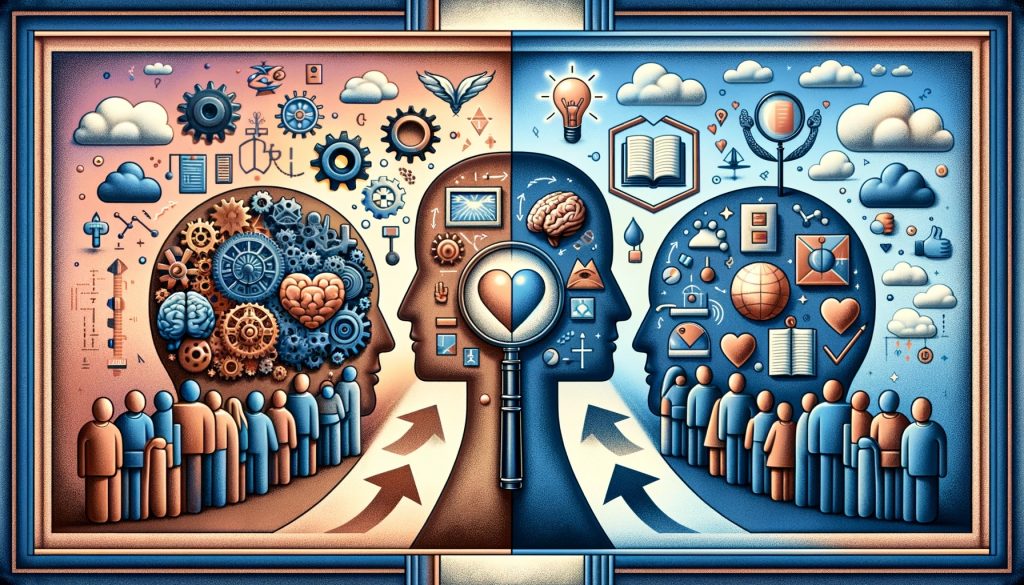In the pursuit of fostering inclusive environments, understanding the nuances between cognitive biases and beliefs is crucial. This distinction not only enhances self-awareness but also propels leaders towards more equitable and effective decision-making. Too many conflate the two. At Percipio Company, we delve into these nuances & intricacies to help leaders and organizations navigate the complex landscape of human cognition and workplace behaviors.

Biases versus beliefs
Cognitive Biases: The Silent Saboteurs of Inclusion
Cognitive biases are the silent saboteurs of rational and inclusive thinking. They are by-products of how our brains process information.The unconscious, automatic shortcuts our brains take to process a massive amount of information in milliseconds. While these mental heuristics are beneficial in certain contexts, they often lead us astray before we know it. We are irrational creatures that LOVE to rationalize.
Cognitive biases stem from our brain’s evolutionary need to make swift decisions for survival. They are deeply ingrained patterns that influence how we interpret and respond to the world around us. These biases operate beneath our conscious awareness, making them difficult to recognize and even harder to counteract.
Easy Examples of Cognitive Biases
- **Like-Me Bias**: This refers to the tendency to gravitate towards individuals who are similar to oneself in various aspects, such as background, interests, or demographics. This bias can lead to a preference for people who share similarities. Harmless in most social contexts, however, unmitigated Like me, bias undermines inclusive hiring practices and fostering a more diverse work environment.
- **Anchoring Bias**: This occurs when we rely too heavily on the first piece of information we encounter (the “anchor”) when making decisions. The retail industry depends on this bias to thrive. Simply pronouncing an item as “half-off” illicits an automatic cognitive reaction “anchored” on the original list price. “I’ll take two!” is too often the immediate reaction. We rarely stop to question the source or credibility.
- **Availability Bias**: This bias (or commonly referred to as the Availability Heuristic) leads us to overestimate the importance of information that is most readily available, often because it is recent or particularly memorable. This can skew our perception of reality and influence our decisions based on vivid anecdotes rather than solid data. Our brains follow the path of least resistance.
The impact of cognitive biases is profound. In organizational settings, these biases can serve us well. They can also undermine decision-making processes, stifle innovation, and perpetuate inequities. For inclusive leaders, recognizing and mitigating these biases is essential for fostering a culture of critical thinking, innovation, and collaboration.
The Nature of Beliefs

Nature of Beliefs
Beliefs, on the other hand, are not by-products but rather a source of unconscious bias. The convictions or acceptances that certain things are true or real. They are deeply held and often consciously embraced, shaping our worldview and influencing our actions over a long period. Beliefs are shaped by a myriad of factors, including upbringing, culture, religion, education, and personal experiences. Unlike cognitive biases, beliefs are more stable, enduring, and rarely questioned by the group that holds them. They provide a framework for understanding the world and making sense of our experiences.
Easy Examples of Beliefs
- **Religious Beliefs**: These are beliefs grounded in the doctrines of a particular religion. They provide moral guidance and a sense of purpose for many individuals.
- **Cultural Beliefs**: These beliefs are shared by a community or society. For example, the belief in individualism versus collectivism can significantly influence behavior and decision-making within different cultural contexts.
- **Personal Beliefs**: These are individual convictions, such as the belief in the value of hard work or the importance of honesty. Personal beliefs can drive motivation and shape personal and professional goals.
While cognitive biases and beliefs are distinct, they are not mutually exclusive. They often interact and influence each other in complex ways. For instance, a strong belief can give rise to a cognitive bias. This is an indicator and core tenet of Egocentric Bias. If you firmly believe in a particular political ideology, you may exhibit confirmation bias by seeking out information that supports your viewpoint and ignoring opposing evidence. Beliefs about what’s “normal” in the workplace are a prime source of bias. For years, the status quo was defined by social norms that were determined by those with power, privilege and authority and everyone else was expected to just know the “rules” (beliefs) and the focus (bias) is on how to best fit in or assimilate.

Halo Effect
A common example of this bias-to-belief intersection is the “halo effect.” The halo effect occurs when an individual’s positive qualities or characteristics in one area are assumed to be present in other areas as well. For instance, if a person is perceived as physically attractive, there is a tendency to also assume they are intelligent, kind, or talented without necessarily having evidence to support these assumptions. This can influence how people interact with and perceive others, leading to biased judgments and decisions based on superficial characteristics rather than actual abilities or qualities. Enter the Bias Ecosystem—a nifty model that helps us unravel these cognitive traps and dismantle our self-defeating beliefs.
Understanding the distinction between cognitive biases and beliefs is not just an academic exercise; it is a practical tool for enhancing decision-making and fostering a more inclusive, rational, and effective organizational culture. Inclusive leaders at Percipio Company are committed to helping leaders and organizations navigate this complex landscape, moving from bias to belonging® and unlocking their full potential. We emphasize the importance of introspection and self-reflection in navigating the interplay between biases and beliefs. By becoming aware of these cognitive processes, inclusive leaders can take deliberate steps to counteract their negative effects and foster more rational, inclusive decision-making, strengthen employee relationships, and disrupt systemic biases.
Send your comment/question and a Percipio rep will get back to you within 24 hours.Send your comment/question and a Percipio rep will get back to you within 24 hours.

Percipio Company is led by Matthew Cahill. His deep expertise in cognitive, social, and workplace biases is rooted in the belief that if you have a brain, you have bias®. He works with executives to reduce mental mistakes, strengthen workplace relationships & disrupt existing bias within current HR processes, meeting protocols and corporate policies. Matthew has demonstrated success with large clients like LinkedIn, Salesforce and dozens of small to mid-size companies looking to create more inclusive workplaces, work smarter, generate more revenue and move from bias to belonging®.

